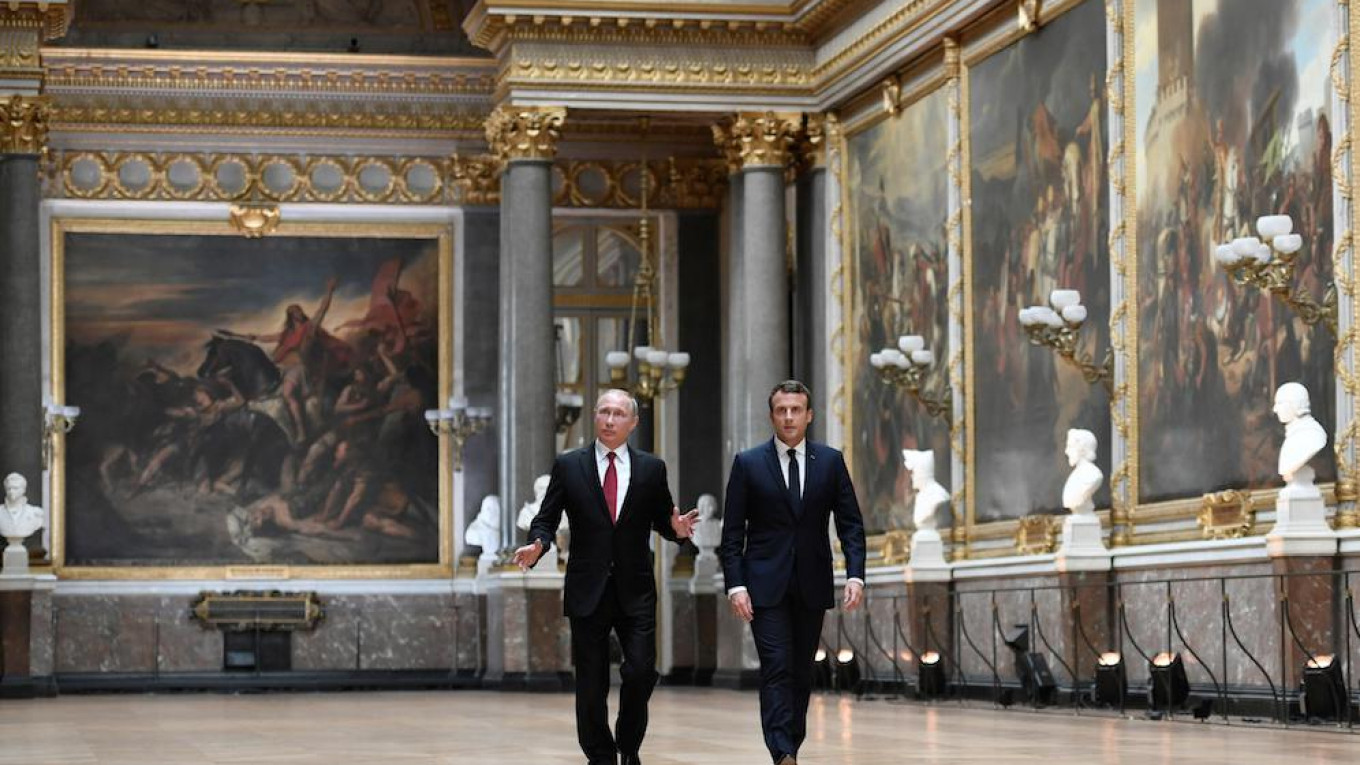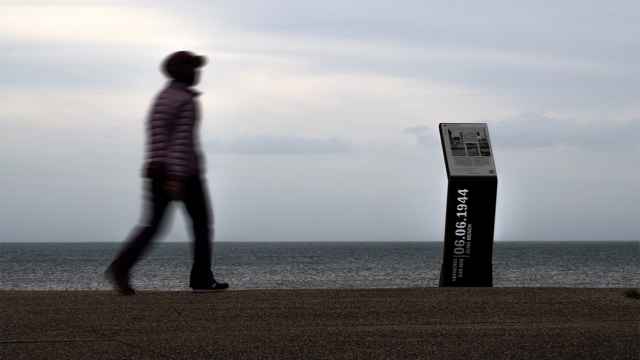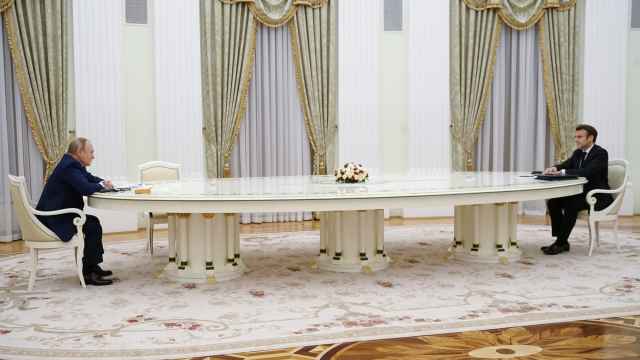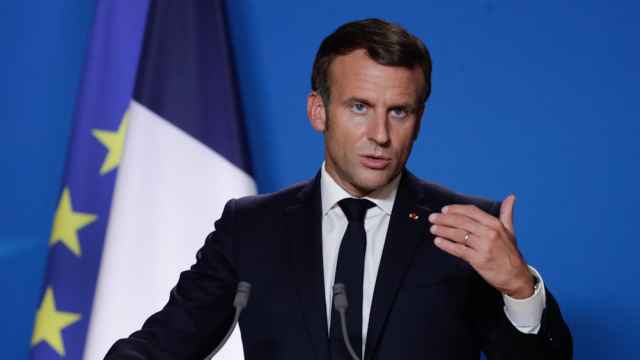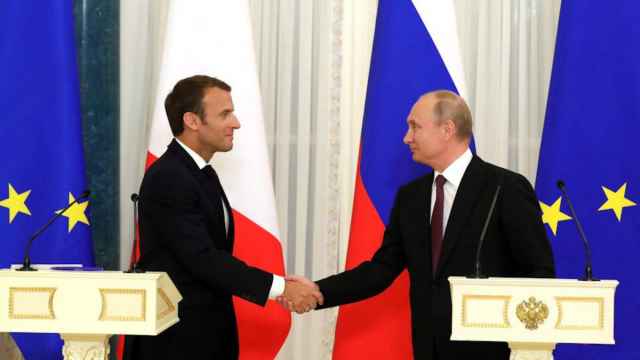A few hours after his return from Versailles, Vladimir Putin chose to give an interview to the right-wing newspaper Le Figaro.
With hardly veiled resentment, he took issue with his host, newly elected French President Emmanuel Macron, and rebuffed him on the major points of contention that came out during their May 29 press conference: Syria, Ukraine, and interference in the French electoral campaign.
In Versailles, Putin listened sternly to Macron’s moral lesson about Ukraine and human rights in Chechnya, said little, and looked impatient to leave. Now, he played the deciding match—without the contender, on his own terms, and at the new Russian Orthodox center he had belatedly opened on the banks of the Seine.
Vladimir Putin’s methods are well-known to seasoned Russia observers. He denies established facts—like Damascus’s use of chemical weapons against civilians. He angrily dismisses foreign leaders’ positions on the Ukrainian conflict. And he speaks insincerely about the Russian state media’s smear campaign against Macron and the hacking of his movement’s website and emails.
Oddly, Putin strongly defended his right to welcome Marine Le Pen in the Kremlin during the presidential race.
The new French president is learning the hard way what it costs to have a “very frank and direct” exchange with the master of the Kremlin. The Russian president has spent seventeen years at the helm. Macron, meanwhile, is taking his first steps in international power politics and probably misread his guest’s reasons and expectations for this meeting.
Putin was seeking honor and respect, recognition of his stature as dean of the “concert of nations,” and also a benign French response to his aggressive military policies for “restoring legal order and peace” in Syria and Ukraine. He was taking an opportunity to make a comeback on the European stage, after the G7 summit in Sicily held without him.
Putin was not looking for a frank, honest discussion on issues of war and peace. And he certainly did not expect Macron to open the press conference with strong criticisms of state violence against gay men in Chechnya and to hint that he, Putin, should fix this.
To Moscow, the most offensive part of the failed show was that the Russian authorities had worked hard to obtain this invitation from the Elysée Palace. They wanted Macron to repair the humiliation of October 2016, when François Hollande advised Vladimir Putin against visiting Paris to inaugurate the new Russian Orthodox center. At the time, the Russian military was helping Bashar Assad’s army in their brutal assault on Aleppo.
The Kremlin’s preference for armed conflict over negotiation has a deeply corrosive effect on its relationship with France, despite a “centuries-long friendship.” Trust is gone.
Vladimir Putin did not come to Versailles to negotiate a way out of the Syrian tragedy. He came to drag Macron into his political logic, in which the global struggle against terrorism predominates, no matter what.
But in France, Italy, Germany, Greece and Romania, the public sees a clear link between Russia’s military participation in the war and refugees crossing our borders. Even the most pernicious fake news and propaganda cannot whitewash the glaring facts: Russia’s use of military force creates more insecurity and does not help us fight back against terrorists in our cities.
For the new French president, Versailles was an eye-opening experience. Vladimir Putin cannot be seduced, lectured or talked into a rational, “fully inclusive” (Macron’s words) multilateral diplomatic negotiation. There is no bait that he is willing to take.
Putin wants to talk with Western leaders on his own terms—and those terms alone. He has shown he is not willing to compromise in order to restore a broken partnership with Europe.
For Emmanuel Macron, the path forward is clear—the further strengthening of the Franco-German tandem and of Europe’s political, economic and military unity. Given the current unpredictability of U.S. policies and its shaky commitment to NATO, European states will likely close ranks. In this renewed strategy of common security and foreign policy, France will play a leading role.
And Putin has given us one more incentive to ensure ideas of narrow national interest do not get in the way of a unified European position toward the Russian leadership.
A Message from The Moscow Times:
Dear readers,
We are facing unprecedented challenges. Russia's Prosecutor General's Office has designated The Moscow Times as an "undesirable" organization, criminalizing our work and putting our staff at risk of prosecution. This follows our earlier unjust labeling as a "foreign agent."
These actions are direct attempts to silence independent journalism in Russia. The authorities claim our work "discredits the decisions of the Russian leadership." We see things differently: we strive to provide accurate, unbiased reporting on Russia.
We, the journalists of The Moscow Times, refuse to be silenced. But to continue our work, we need your help.
Your support, no matter how small, makes a world of difference. If you can, please support us monthly starting from just $2. It's quick to set up, and every contribution makes a significant impact.
By supporting The Moscow Times, you're defending open, independent journalism in the face of repression. Thank you for standing with us.
Remind me later.



